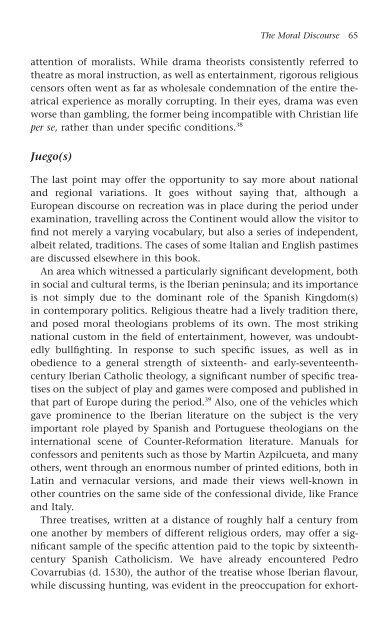Recreation in the Renaissance
Recreation in the Renaissance
Recreation in the Renaissance
- No tags were found...
Create successful ePaper yourself
Turn your PDF publications into a flip-book with our unique Google optimized e-Paper software.
The Moral Discourse 65<br />
attention of moralists. While drama <strong>the</strong>orists consistently referred to<br />
<strong>the</strong>atre as moral <strong>in</strong>struction, as well as enterta<strong>in</strong>ment, rigorous religious<br />
censors often went as far as wholesale condemnation of <strong>the</strong> entire <strong>the</strong>atrical<br />
experience as morally corrupt<strong>in</strong>g. In <strong>the</strong>ir eyes, drama was even<br />
worse than gambl<strong>in</strong>g, <strong>the</strong> former be<strong>in</strong>g <strong>in</strong>compatible with Christian life<br />
per se, ra<strong>the</strong>r than under specific conditions. 38<br />
Juego(s)<br />
The last po<strong>in</strong>t may offer <strong>the</strong> opportunity to say more about national<br />
and regional variations. It goes without say<strong>in</strong>g that, although a<br />
European discourse on recreation was <strong>in</strong> place dur<strong>in</strong>g <strong>the</strong> period under<br />
exam<strong>in</strong>ation, travell<strong>in</strong>g across <strong>the</strong> Cont<strong>in</strong>ent would allow <strong>the</strong> visitor to<br />
f<strong>in</strong>d not merely a vary<strong>in</strong>g vocabulary, but also a series of <strong>in</strong>dependent,<br />
albeit related, traditions. The cases of some Italian and English pastimes<br />
are discussed elsewhere <strong>in</strong> this book.<br />
An area which witnessed a particularly significant development, both<br />
<strong>in</strong> social and cultural terms, is <strong>the</strong> Iberian pen<strong>in</strong>sula; and its importance<br />
is not simply due to <strong>the</strong> dom<strong>in</strong>ant role of <strong>the</strong> Spanish K<strong>in</strong>gdom(s)<br />
<strong>in</strong> contemporary politics. Religious <strong>the</strong>atre had a lively tradition <strong>the</strong>re,<br />
and posed moral <strong>the</strong>ologians problems of its own. The most strik<strong>in</strong>g<br />
national custom <strong>in</strong> <strong>the</strong> field of enterta<strong>in</strong>ment, however, was undoubtedly<br />
bullfight<strong>in</strong>g. In response to such specific issues, as well as <strong>in</strong><br />
obedience to a general strength of sixteenth- and early-seventeenthcentury<br />
Iberian Catholic <strong>the</strong>ology, a significant number of specific treatises<br />
on <strong>the</strong> subject of play and games were composed and published <strong>in</strong><br />
that part of Europe dur<strong>in</strong>g <strong>the</strong> period. 39 Also, one of <strong>the</strong> vehicles which<br />
gave prom<strong>in</strong>ence to <strong>the</strong> Iberian literature on <strong>the</strong> subject is <strong>the</strong> very<br />
important role played by Spanish and Portuguese <strong>the</strong>ologians on <strong>the</strong><br />
<strong>in</strong>ternational scene of Counter-Reformation literature. Manuals for<br />
confessors and penitents such as those by Mart<strong>in</strong> Azpilcueta, and many<br />
o<strong>the</strong>rs, went through an enormous number of pr<strong>in</strong>ted editions, both <strong>in</strong><br />
Lat<strong>in</strong> and vernacular versions, and made <strong>the</strong>ir views well-known <strong>in</strong><br />
o<strong>the</strong>r countries on <strong>the</strong> same side of <strong>the</strong> confessional divide, like France<br />
and Italy.<br />
Three treatises, written at a distance of roughly half a century from<br />
one ano<strong>the</strong>r by members of different religious orders, may offer a significant<br />
sample of <strong>the</strong> specific attention paid to <strong>the</strong> topic by sixteenthcentury<br />
Spanish Catholicism. We have already encountered Pedro<br />
Covarrubias (d. 1530), <strong>the</strong> author of <strong>the</strong> treatise whose Iberian flavour,<br />
while discuss<strong>in</strong>g hunt<strong>in</strong>g, was evident <strong>in</strong> <strong>the</strong> preoccupation for exhort-










